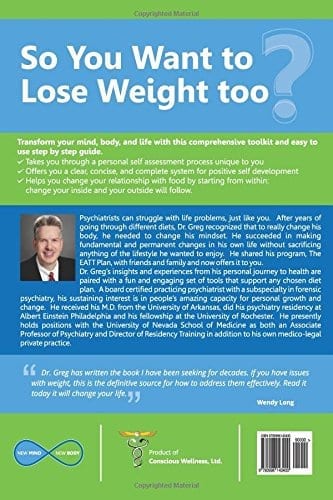Description
n
Review
n
nDr. Brown invites us to take a new approach in the journey of weight loss. This book acts as a guide through a very real self-inventory in addition to providing practical strategies with the goal of providing long term success. – Alison Netski, M.D., Assistant Professor of Psychiatry, University of Nevada School of Medicine
n
nI wanted to let you know that after reading your book and talking to you, I started “taking steps” and have lost 2 dress sizes and FEEL GREAT!!! It’s because of you! Your book and program has made a huge difference to me. Thank you so much! -Ann McIndoo, Author
n
nThis book is an excellent introduction to the psychology of eating, with material to satisfy both beginners and experts. It is deftly written, clear yet detailed, and I heartily recommend it to anyone interested in the subject. – Michael R. Madow, M.D., Fellow of the American Psychiatric Association
n
nDr. Greg has written the book I have been seeking for decades. If you have issues with weight, this is the definitive source for how to address them effectively. Read it today–it will change your life. -Wendy Long
n
n
n
From the Author
n
n
nWho am I? I am a psychiatrist who has evaluated hundreds of patients considering gastric bypass surgery and Lap-Band placement surgery. I have had the opportunity to hear and understand their stories. I bring the knowledge and skill set of a physician to understand the problem of continuing weight difficulties and problems. Perhaps you have spoken to your doctor about weight loss, and may believe my credentials are not enough.
n
nThe real reason you might choose to read this book is my own personal lifelong challenges with weight control and answers that I have discovered over the course of time.
n
nIt is stunning to me, in retrospect, to recall that throughout the entirety of medical school, I had a total of two hours of lecture time devoted to diet, food and appropriate food choices in a curriculum that lasted four years. This was followed by four years of residency and an additional year of fellowship, which never raised the topic, in spite of recommending weight loss to many patients during that time frame.
n
nMy weight journey began in high school when I started gaining weight and did not have a good way of stopping it. Up-and-down diets, trying everything from low-fat to low-carb to half portions to exercise all worked briefly, but soon followed weight gain beyond the amount lost.
n
nIn approximately 2011, I hit my weight pinnacle of 248 pounds after stepping off a wonderful cruise that my wife and I enjoyed in Alaska. When I got home and weighed myself, I was horrified, disgusted, and absolutely fed up with myself in pretty much every way that I could imagine.
n
nI went on a halfhearted low-carb diet at that point and dropped a few pounds, then got disgusted with that and stopped, followed by a half-portion diet, which I will discuss later, and then got completely stuck. I knew that I would not undergo a surgical procedure for this problem, and I knew that I would not take any form of medication to lose weight either.
n
nIn one of those shower insights I realized, “You are a psychiatrist. If anyone can figure this out, it is you, so get to it!”
n
nFirst, I extensively searched for books and other materials with the focus on the actual path of what was needed to psychologically change in order to successfully lose weight, and I found exceptionally little as a guide or a help in this entire process. As I began to work through layers and issues and explore different parts of myself that led me down a successful path of weight loss, I began to understand that this was a bigger picture than a simple set of behavioral challenges.
n
nOne insight that came to me was from a rather archaic psychoanalytic term called “overdetermination” or “overdetermined symptoms.” Once I was able to see weight challenges as being an overdetermined symptom, this opened a series of doors that allowed me to change the various pieces of myself using a series of techniques I will share.
n
nI will discuss overdetermination in a later chapter, but it is one of the keys to understanding why weight is such a big challenge over a lifetime. I was able to successfully lose sixty pounds and astound my family physician by lowering my blood cholesterol by over forty points in the process. I used a specific diet, but the change was that the diet became a comfortable lifestyle rather than an obstacle to fight against.
n
nOne metaphor I envisioned that helped put this entire principal into a larger picture is the metaphor of a string a pearls in which each episode of eating or desiring food or picking food or choosing food or putting it in your mouth matches a pattern that you have developed over the course of a lifetime. That pattern is represented by the shape of an energetic string created by life experience. You place each food-related experience onto this vibrant string, provided they match the shape of the string. Chips fit on the string when you feel upset, celery sticks, not so much.
n
nIf you had a choice of a good food or a bad food, you are going to pick the food that matches your experience, or your string, rather than picking something that would suit your new health goals.
n
nUntil you identify the characteristics of your string, you will continue to automatically put pearls on that string no matter how unhealthy or unreasonable they are. This drives the unconscious desire for foods and particular food groups that are likely the opposite of your consciously stated goal of weight loss.
n
nThe awesome piece of information is that there are a series of techniques that you can use after you have identified the string, or the core of the string, to begin breaking up the pearls and reshape the string to allow you to naturally eat more healthily without feeling deprived and without feeling as if you are missing something, which changes the entire emotional complex of eating into a more healthy endeavor.I will be including various stories from patients and others interwoven throughout the book. Because my field requires an exceptionally high degree of confidentiality, there will be no identifying information presented about these individuals. Everything irrelevant to the point will be disguised in every measure – gender, job, age – however, the central point of each particular story will be clear and representative of that individual’s life experiences.
n
n
New Mind, New Body: The Inner Makeover for a New You
nSo you want to lose weight, too? Transform your mind, body, and life with this comprehensive toolkit and easy to use step by step guide, which takes you through a personal self assessment process unique to you; offers you a clear, concise, and complete system for positive self development; and helps you change your relationship with food by starting from within. Psychiatrists can struggle with life problems, just like you. After years of going through different diets, Dr. Greg Brown recognized that to really change his body, he needed to change his mindset. He succeeded in making fundamental and permanent changes in his own life without sacrificing anything of the lifestyle he wanted to enjoy. He shared his program, The EATT Plan, with friends and family and now offers it to you. Dr. Greg’s insights and experiences from his personal journey to health are paired with a fun and engaging set of tools that support any chosen diet plan.







Reviews
There are no reviews yet.